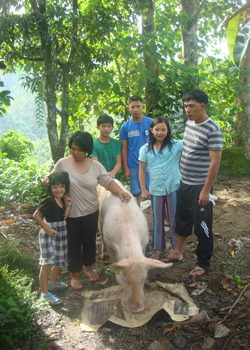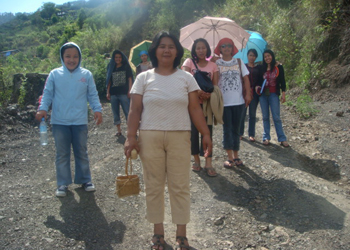Story by Jun Dom-oguen / Program Officer / Heifer Philippines
And Karla Narcise-Rodulfo / PME Manager / Heifer Philippines
Photos by Jun Dom-oguen
 Irene Pandosen, the first of seven children, was born in Lepanto on June 18, 1974. Her parents, Mary and Simon, are both natives of the Mountain Province. Due to the hard life in Tucucan, her father worked as a miner in the Lepanto Mining Corporation in Mangkayan, Benguet where they lived.
Irene Pandosen, the first of seven children, was born in Lepanto on June 18, 1974. Her parents, Mary and Simon, are both natives of the Mountain Province. Due to the hard life in Tucucan, her father worked as a miner in the Lepanto Mining Corporation in Mangkayan, Benguet where they lived.
Pandosen grew up and finished college with a bachelor of science degree in agriculture with a major in Agroforestry from Benguet State University. Life was never easy back then, Irene recalled, and many sacrifices were made just for her to finish her education. However, just after graduation, she married Edgar, a college graduate from the same university. They were blessed with four children, Asher, 16, Hezekiah, 15, Hannah, 12, and Dulce Amor, 12. Irene decided to be a full-time mother.
Her husband was hired as a teacher in a vocational school in Kalinga, a far-flung province. The family migrated to Kalinga but after two years Edgar was terminated because he was not originally from Kalinga, and the government had put a prioritization on local people for employment.
Irene was hired by Mountain Province Polytechnic College, Tadian Campus. Her family moved to Mountain Province for two years until her contract ended. With no job and nowhere to go, Irene and her family returned to Tucucan and stayed at her parents’ old house, which was made of wood and iron sheets. Her parents eventually gave the house to them as her inheritance.
In Tucucan, her husband worked on call as a daily wage carpenter, and Irene worked in the fields as a daily wage earner. Eventually she was accepted as a day-care teacher in Tucucan with a monthly income of $95 per month. She held this position from 2001 to 2006. In 2006, she transferred to the Christian Baptist School in Bontoc and worked as a nursery school teacher until 2008. In 2009, she worked as a part-time teacher at the Mountain Province Polytechnic College, Bontoc Campus for Adult Learning, but did not last long as the Commission on Higher Education decided that teachers should hold an education degree.
Irene said, “With no permanent and continuous source of income, I was worried about my children. The two eldest were about to go to college, followed by the third who will be in high school. I was preparing to look for a job in other places, which would result in us moving away from Tucucan again or leaving my family behind.”
Her prayers were answered in January of 2010 when Heifer Philippines approved a project called Unique Gift-Giving for the Upliftment of Generous Families to Attain Harmony and Unity Among Tribes (UG-UGFHU). It was implemented by the Episcopal Diocese of Northern Philippines, and Irene attended the orientation meeting and enlisted as an original partner family.
“This project changed my mind; I was no longer interested in looking for a job in other places. I was very positive that the project would make a big difference in our community, and I would no longer have to leave my family,” she said.
After five months of organizing and preparing, the partner families received their gifts in the original placement celebration in June 2010. Fifty of the original 73 families received pigs while the remaining 23 received goats.
Irene volunteered to be the Community Animal Health Worker (CAHW) and boar holder for the project families. Everything Irene had wished for, and more, started then.
Right after the CAHW Training in September of 2010, Irene was put to the test. Almost all of the swine in the community had been affected by the Porcine Reproductive and Respiratory Syndrome epidemic. This viral disease affected pregnant pigs as well as those who have given birth. It causes very high fever which can result in miscarriage, early or premature birth, or even death, of mother and/or piglets.
Irene coordinated closely with the Provincial Veterinary Office of Mountain Province to control this disease among the livestock of project participants. As a result, only four pigs owned by the project participants died compared to more than 50 owned by non-members. Although the disease was controlled, mating was stopped for the affected pigs, which delayed reproduction and the Passing on the Gift®.
Irene said, “The epidemic was the turning point in my capacity as CAHW. Most of the families doubted my knowledge. They would ask me things about animal diseases and how to the control them, and then go to the veterinarian and ask the same question to see if my answers and explanations were the same. It’s good that what I told them was correct. I take every opportunity to learn so that I can give good service. I talk to veterinarians and research every time I find an opportunity. I take learning as my responsibility to my group and to the community as well.”
 One of Irene’s strengths is her skills with the practice of artificial insemination (AI) for pigs. Her village has a very rugged and steep terrain with pathways of stone stairways, making it very difficult to transport the boar. Aside from the boar being at risk, the holder is also at risk. Because of this, AI was encouraged. Through the coordination of Heifer and the Provincial Department of Agriculture Technician, training was conducted in Tucucan and all the CAHWs from Mountain Province were invited to attend.
One of Irene’s strengths is her skills with the practice of artificial insemination (AI) for pigs. Her village has a very rugged and steep terrain with pathways of stone stairways, making it very difficult to transport the boar. Aside from the boar being at risk, the holder is also at risk. Because of this, AI was encouraged. Through the coordination of Heifer and the Provincial Department of Agriculture Technician, training was conducted in Tucucan and all the CAHWs from Mountain Province were invited to attend.
After the training, Irene immediately started practicing AI. “When the families and non-members saw the results, AI became very popular. I learned the techniques and slowly shared them with my fellow SHG members who were willing to learn. I served a total of 132 families in our village, both SHG members and non-members, in one cycle. I also served families from the neighboring villages of Sadanga, such as Annabelle, Betwagan and Poblacion,” Irene said.
Asked of the advantages of AI, Irene answered, "It is much easier. I can easily carry the equipment to the sow. With mating, I spend much energy in getting the boar to and from the site. The result is the same number of piglets depending on the timing. It is also easier for the sow because she does not have to carry the weight of the boar. In addition, I can also serve far-away villages easily.”
Irene’s dedication as a CAHW helped the project to recover from the disease epidemic. Original families were all able to pass on their livestock gifts to the Sadanga tribe members in POG celebrations held September and December, 2011. Irene regularly helps in the facilitation of Heifer’s 12 Cornerstones for Just and Sustainable Development, Improved Animal Management and CAHW training for the pass-on families. She monitors the pass-on families after the POG weekly to ensure the good health of the animals and conducts AI services. She serves as a resource person to other grassroots organizations in improved animal management and also performs ear-tagging for the livestock.
“Because of the project, I became a new Irene. I developed the right attitude towards life and how to live life in service of others. I share the joy with the people when their pigs are healthy and productive and they earn income from it to improve their lives. Before, my community saw me as the day care teacher, a happy go-lucky lady or the talkative woman. Now, they see me as a partner in their livelihood, an extension worker and sometimes even refer to me as the animal doctor. I can now feel that they trust me,” Irene said with a smile.
“My income as a CAHW from January to June of 2011 averaged $23 a month and I was given 32 piglets as a share from the AI breeding service. But, from July 2011 to June 2012, my monthly income averaged $357 from the sale of my piglet shares and cash payment for CAHW and AI breeding services. I don’t charge when I see that the family is really struggling. My happiness comes from seeing their animal healthy and productive,” she said.
“The breeding service helped to unite my family. At first my husband was indifferent, especially because it took a lot of my time. But I was able to convince him to help me, and once he realized it gives income to our family he learned to do AI as well. My second child, Hezekiah, also helps with AI. All members of my family have developed a passion in the delivery of the breeding services. It is now our family responsibility and enterprise,” Irene said proudly.
“I am no longer weary of what the future holds for my family. I have found what I love to do most?to be of service to others. My husband and I can now provide for my children without leaving the community we have grown to love. We need not be separated just to look for a means to survive. This project has kept us together. I think, that would be a good thing to pass on, too.”